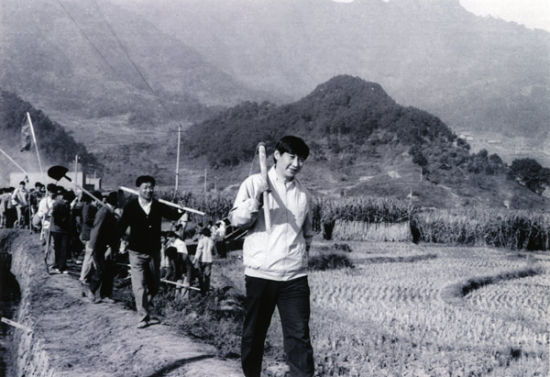双语:新华社英文推出习近平人物特稿
 时任中共福建省宁德地委书记的习近平在去农村调研期间参与劳作。
时任中共福建省宁德地委书记的习近平在去农村调研期间参与劳作。这张摄于1988年的资料照片显示,时任中共福建省宁德地委书记的习近平在去农村调研期间参与劳作。
新华社英文今晚推出“中共高层新阵容”系列人物特稿。以下为介绍习近平同志的长篇特写:
BEIJING, Dec. 23 (Xinhua) -- The new helmsman of the Communist Party of China (CPC) Xi Jinping has been acclaimed as a leader advocating reform and the China Dream and bringing a fresh breeze into China's political life。
Xi, 59, who was elected to his new role at the first plenum of the 18th CPC Central Committee on Nov. 15, is the first top Party leader born after 1949, the year the People's Republic of China was founded。
He now leads the 91-year-old CPC, the world largest political party with more than 82 million members, as it rules China, the world's second largest economy。
The whole country and the world are putting their eyes on Xi Jinping。
As he met the press on the November day the new leadership was formed, Xi summed up the CPC's mission as comprising three responsibilities -- to the nation, the people and the Party。
"The people's longing for a good life is what we are fighting for," Xi said in his first public speech as general secretary on Nov. 15.
Shortly after taking office, Xi and the other six members of the Standing Committee of the Political Bureau of the CPC Central Committee visited the exhibition "The Road Toward Renewal" at the National Museum of China. The comprehensive display illustrates the huge challenges China has surmounted on the road to national revival since 1840.
"Nowadays, everyone is talking about the China Dream," he said. "In my view, realizing the great renewal of the Chinese nation is the Chinese nation's greatest dream in modern history."
To achieve this sacred goal, Xi has clarified his positions on various aspects of the country's development。
From the Loess Plateau to the southeast coast, from localities to the central leadership, Xi has had a well-rounded political career and has developed a deep understanding of the conditions of his country and people。
In 2007, he was promoted to the nine-member Standing Committee of the Political Bureau of the 17th CPC Central Committee, the Party's top decision-making body, after working for decades in various locations, including Shanghai Municipality, the provinces of Shaanxi, Hebei, Fujian and Zhejiang, as well as the army。
He served concurrently as a member of the Secretariat of the CPC Central Committee and as president of the Party School of the CPC Central Committee. In 2008, he was elected the country's vice president。
Over the past five years, he has participated in the creation of major policies for the Party and the country, and has gained rich leadership experience in all respects. Beginning in 2008, he worked intensively on the campaign to study and implement the Scientific Outlook on Development。
He also led a group of officials in drafting the 17th CPC Central Committee's report to the 18th CPC National Congress and the amendment to the CPC Constitution, which were adopted at the congress and have become important guidelines for China's future。
He became CMC vice chairman in 2010 and was named CMC chairman at the first plenum of the 18th CPC Central Committee。
In 2008, Xi was also tasked with heading up preparations for the much-anticipated 2008 Olympic Games and the subsequent Paralympics, playing a key role in China's hosting of these high-standard events with distinctive features。
BEIJING, Dec. 23 (Xinhua) -- Xi Jinping, the newly elected general secretary of the Communist Party of China Central Committee, has a unique experience as an "educated youth" in rural China when he was a young man. Xi is believed to be deeply steeled by his early years。
A son of Xi Zhongxun, a Communist revolutionary hero and former vice premier, Xi Jinping did not live in comfort as a boy。
Beginning in 1962, when his father was wronged and fell in disgrace, Xi experienced tough times. During the Cultural Revolution (1966-1976), he suffered public humiliation and hunger, experienced homelessness and was even held in custody once。
At the age of 16, he volunteered to live in a small village in northwest China' s Shaanxi Province as an "educated youth."
That area, part of the Loess Plateau, was where the Communist revolutionaries, including his father, rose to found New China。
Life there was tough for a city youth. In the beginning, fleas troubled him so badly he could not even fall asleep. In the Shaanxi countryside, he had to do all sorts of harsh labor, such as carrying manure, hauling a coal cart, farming and building water tanks。
As time passed, tough work became easy. Xi became a hardworking capable young man in the villagers' eyes. By gaining their trust, he was elected village Party chief。
He led the farmers to reinforce the river bank in a bid to prevent erosion, organized a small cooperative of blacksmiths in the village, and built a methane tank, the first in landlocked Shaanxi。
He was once awarded a motorized tricycle after being named a "model educated youth." However, he exchanged the tricycle for a walking tractor, a flour milling machine and farm tools to benefit the villagers。
Although he was not in school, Xi never stopped reading. He brought a case of books to the village and was always "reading books as thick as bricks," recalled by villagers of Liangjiahe。
He formed close ties with the villagers during his seven years in the province. After he was recommended for enrollment at Tsinghua University in 1975, all the villagers queued to bid him farewell and a dozen young men walked more than 30 kilometers to take him to the county seat for his trip back to Beijing。


